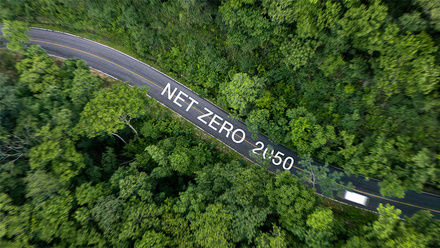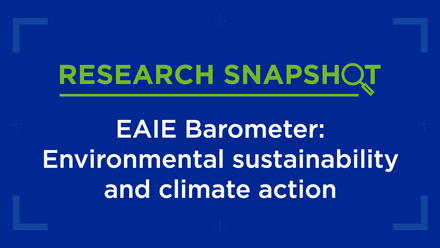The MSCA Green Charter: sustainable research excellence

The environmental impact of research activities is a growing concern among the research and innovation community. The need to rethink how we do research – in particular to reduce the carbon footprint of scientific activities – has increasingly become a topic of discussion among researchers. But how far can we go in reducing greenhouse gas emissions while maintaining scientific excellence and innovation?
Under the Marie Skłodowska-Curie Actions (MSCA), the European Commission has developed the MSCA Green Charter, an innovative instrument to mitigate the environmental impact of research activities without giving up on research excellence.
The MSCA and the European Green Deal
The MSCA are the European Union’s flagship programme for the mobility and training of researchers, as well as the development of excellent doctoral programmes, with a strong structuring effect on participating institutions. They encourage international, intersectoral and interdisciplinary mobility, and as such have their share of responsibility in producing – and reducing – greenhouse gas emissions.
The MSCA Green Charter seeks to serve as a catalyst in promoting best practice in sustainable research and project management
Following the European Commission’s commitment to tackling climate and environmental challenges, embodied in the European Green Deal, the MSCA have developed the MSCA Green Charter to lay down a set of principles that promote the sustainable implementation of research and project activities. In so doing, the Commission seeks to reduce the environmental footprint of MSCA-funded projects, to raise awareness of environmental sustainability, and to serve as a catalyst in promoting best practice in sustainable research and project management.
The MSCA Green Charter
The MSCA Green Charter constitutes a code of good practice for all recipients of MSCA funding – both individual researchers and institutions – and promotes the mainstreaming of environmental considerations in all aspects of project implementation.
Participants in MSCA-funded projects are encouraged to adhere to the Charter on a "best effort" basis, and to commit to as many of its provisions as possible during the implementation of their respective projects. Some measures they are invited to consider are to:
- promote green purchasing for project-related materials;
- ensure the sustainability of project events;
- use low-emission forms of transport;
- promote teleconferencing whenever possible;
- develop awareness on environmental sustainability;
- share ideas and best practice examples.
While physical mobility remains a central component of the MSCA, the Charter encourages researchers and participating organisations to take the lead in avoiding unnecessary travel, in the creative use of teleconferencing tools, and in reducing their carbon emissions in a way that sets a positive example to others within the research and innovation communities.
As a light incentive to raise awareness of the principles of the Charter among MSCA candidates and beneficiaries, projects reaching their final stage are now invited to report on the efforts deployed to adopt sustainable practices. As from 2024, sustainability considerations may play a role in the evaluation of otherwise ex-aequo proposals – that is to say, in cases in which proposals have been evaluated as equally excellent and impactful, and additional criteria have to be considered to decide between them. This does not and must not compromise the bottom-up nature of the programme, where the applicants choose topics freely and the main drivers are scientific excellence and innovation.
Tracking progress
The Commission is currently completing a survey of the first batch of projects funded under the 2021 calls of the MSCA, to assess the impact of the Charter and see whether more incentives – or binding measures – are needed in the future. A total of 529 respondents from all relevant Marie Skłodowska-Curie Actions took part in the survey.
Preliminary results show that 61% of respondents work in institutions which have a strategy in place to promote sustainable research and adopt green practices in research activities, and that nearly all of them plan to take measures to integrate environmental considerations in line with the MSCA Green Charter over the lifetime of their project.
Some of the most frequent measures envisaged by institutions are to:
- encourage teleconferencing and hybrid conferencing in those cases where physical presence is not strictly necessary, and provide training to researchers in the efficient use of such tools;
- support MSCA researchers in developing greater awareness on environmental sustainability, and
- provide support and guidance to MSCA fellows in monitoring and minimising the environmental impact of their research activities.
Similarly, individual researchers plan to:
- employ teleconferencing tools as a complement to physical attendance at events, where such attendance is not strictly necessary nor advantageous;
- prevent or minimise the production of waste and harmful substances and - where possible - sort, reuse and recycle any waste by-products unavoidably produced, and
- prioritise low carbon forms of transportation for project-related travel, including commuting.
The survey further looks at the main challenges encountered in the integration of environmental considerations, such as difficulties in changing people’s habits and mind-sets, the lack of green alternatives to single-use consumables, inadequate funding policies for green purchasing, difficulties in finding alternative and affordable means of transport, or the value of in-person meetings as opposed to virtual ones, etc.
Although such challenges should not be underestimated, more than 75% of respondents stated that they did not expect/will not expect challenges in the integration of environmental considerations in their MSCA projects. Asked about what kind of support they would expect from the European Commission to facilitate compliance with the MSCA Green Charter, respondents indicated they expected more communication and promotion of best practice examples (66%), more guidance on how to integrate environmental considerations in projects (54%), and more communication and promotion of the MSCA Green Charter (45%). The provision of financial support was mentioned by 38% of respondents, although only around 15% stated that the lack of financial support is an important factor limiting what could be achieved to incorporate environmental considerations into projects.
A report compiling the main findings and recommendations of the survey will be published in the coming weeks and should help the Commission in shaping its future policy orientations.
Going beyond the MSCA
The Charter is a novelty under the MSCA, and Horizon Europe more generally, and is therefore still not always well known outside the MSCA community. Developed with the help of experts on greening and sustainability in higher education institutions and systems, it is particularly relevant for a community of international professionals, as it is designed for training programmes and projects that have a strong focus on mobility and international collaboration.
Moreover, the principles of the Green Charter have relevance beyond the MSCA. They are offered for consideration to the higher education and research communities beyond their MSCA projects. To further contribute to the take-up of sustainable practices in the sector, the Commission has compiled a set of guidance material and best practice examples which should help researchers and organisations integrate environmental considerations in their research activities – should they be funded by the MSCA or not.
In light of the strong need for targeted information and guidance expressed by respondents of the survey, the Commission will deploy additional efforts to offer targeted guidance to support the take up of sustainable practices in research and project management, drawing from the expertise of international experts as well as from the research and innovation community itself.






